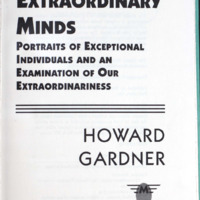-
Title
-
Extraordinary minds : portraits of exceptional individuals and an examination of our extraordinariness
-
Description
-
In Extraordinary Minds, a book as riveting as it is new, Gardner poses an important question: Is there a set of traits shared by all truly great achievers - those we deem extraordinary - no matter their field or the time period within which they did their important work? "In an attempt to answer this question, Gardner first examines how most of us mature into more or less competent adults. He then examines closely four persons who lived unquestionably extraordinary lives - Mozart, Freud, Woolf, and Gandhi - using each as an exemplar of a different kind of extraordinariness: Mozart as the master of a discipline, Freud as the innovative founder of a new discipline, Woolf as the great introspector, and Gandhi as the influencer." "What can we learn about ourselves from the experiences of the extraordinary? Interestingly, Gardner finds that an excess of raw power is not the most impressive characteristic shared by superachievers; rather, these extraordinary individuals all have had a special talent for identifying their own strengths and weaknesses, for accurately analyzing the events of their own lives, and for converting into future successes those inevitable setbacks that mark every life." "Gardner provides answers to a number of provocative questions, among them: How do we explain extraordinary times - Athens in the fifth century B.C., the T'ang Dynasty in the eighth century, Islamic Society in the late Middle Ages, and New York at the middle of the century? What is the relation among genius, creativity, fame, success, and moral extraordinariness? Does extraordinariness make for a happier, more fulfilling life, or does it simply create a special onus?"--BOOK JACKET.
-
Identifier
-
823382
-
465045154
-
Creator
-
Gardner, Howard
-
Format
-
1st ed.
-
Source
-
Brian Lamb Booknotes Collection
-
Gift of Brian Lamb, 2011.
-
Catalog record
-
Language
-
eng
-
Date
-
1997
-
Program air date: October 5, 1997
-
Publisher
-
BasicBooks
-
George Mason University. Libraries. Special Collections & Archives
-
Text
-
Transcription of Annotations
Notes on front endpapers: Emma Laskin and I study of 11 leaders. Earlier study of 7 makers. What is the Master Mind series. What about IQ. Prodigies--Yo Yo Ma, Yehudi Menuhin. Marie Curie. Lamb marked the names of future contributors listed on the verso of the half-title. Lamb has circled words at the start of four of the nine chapter titles. Underlinings/Notes: Underlinings: Mozart, Freud, Woolf, Gandhi--examples of Extraordinary Minds; no absolute divide between ordinary/extraordinary. Goals of book. Freud=Maker; Woolf=Introspector; Gandhi=Influencer as are Marx and Machiavelli. IQ test. Mozart "universal genius." Influences on Mozart. Virginia Woolf's fears, childhood. Gandhi's as leader. Characteristics of influencers. "Notes: "recognized after death," "the Master, the Maker, the Introspector, the Influencer," "intelligence and parents," "adopted children," "African A.," "a genius," "any other human in arts," "age 3 piano," "prodigy," "Hayden 104 s., Mozart 41," "marriage, mother, father," "died 1791," "creative drive," "military commander," "time alone," "Freud's father died at 40, mother at 70," "depression, mania," "her diary d. 1941," "by age 22," "no formal education," "Bloomsbury group," "bisexual," "suicide," "famous gossip," "6 yrs in jail," "11 leaders," "story-telling," "Gandhi," "1891 mother died," "South Africa," "heroic status," "1930 the march."
-
Subject
-
"Mozart, Wolfgang Amadeus, 1756-1791."
-
"Freud, Sigmund, 1856-1939."
-
"Woolf, Virginia, 1882-1941."
-
"Gandhi, Mahatma, 1869-1948."
-
"Gifted persons."
-
"Gifted persons--Case studies."
-
Relation
-
Original Booknotes interview
-
Rights
-
This work may be protected by copyright laws and is provided for educational and research purposes only. Any infringing use may be subject to disciplinary action and/or civil or criminal liability as provided by law. If you believe that you are the rights-holder and object to Mason’s use of this image, please contact speccoll@gmu.edu.
 823382.pdf
823382.pdf